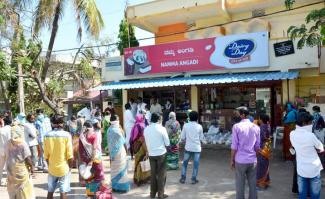
-- Maithreyi Krishnan and Clifton d'Rozario
COVID-19 hit India at a time when a fascist government is implementing its project of converting this nation from a constitutional democracy to a fascist state, even as the economic crisis deepens and unemployment is rising. Since its re-election in May 2019, this RSS/BJP government has set about to implement its fascist agenda of establishing a Hindu Rashtra seen in its brazen actions around the abrogation of Article 370 and the passing of the Citizenship Amendment Act and the declaration of National People’s Register and National Citizens Register. Indeed, the country had risen to the challenge and mounted a spirited resistance to this agenda at which time Covid-19 struck and a lockdown was declared with 4 hours notice.
Covid-19 has given rise to two concurrent crises – the health crisis, and the livelihood crisis that was a direct consequence of Modi’s unplanned lockdown. In fact the lockdown has exposed the precariousness of the existence of 90% of India’s population whose livelihoods are earned in the informal sector. As the ILO notes, ‘In India, Nigeria and Brazil, the number of workers in the informal economy affected by the lockdown and other containment measures is substantial. In India with a share of almost 90 per cent of people working in the informal economy about 400 million workers in the informal economy are at risk of falling deeper into poverty during the crisis’
Jan Bremen in his useful classification of the labour economy describes four types of workers. The labour elite, the petit bourgeoisie, the sub-proletariat, and the paupers or the lumpen proletariat.
The labour elite is defined by regular employment in the public sector or in private enterprises and whose working conditions are protected by trade unions and legitimized by law.
The lumpen proletariat is engaged in heavy work but has low prestige. These workers receive irregular and low wages and their work is not bound to a fixed place or time.
The petty bourgeoisie - works in small enterprises are self-employed and sometimes own one-person firms. They may also engage in economic brokerage, act as money lenders and labour recruiters.
The sub-proletariat – This forms the largest group in the urban labour force. It includes not only the casual and unskilled labourers but also those who are employed by small-scale enterprises…. The lack of dignity and stigma that they face makes them feel
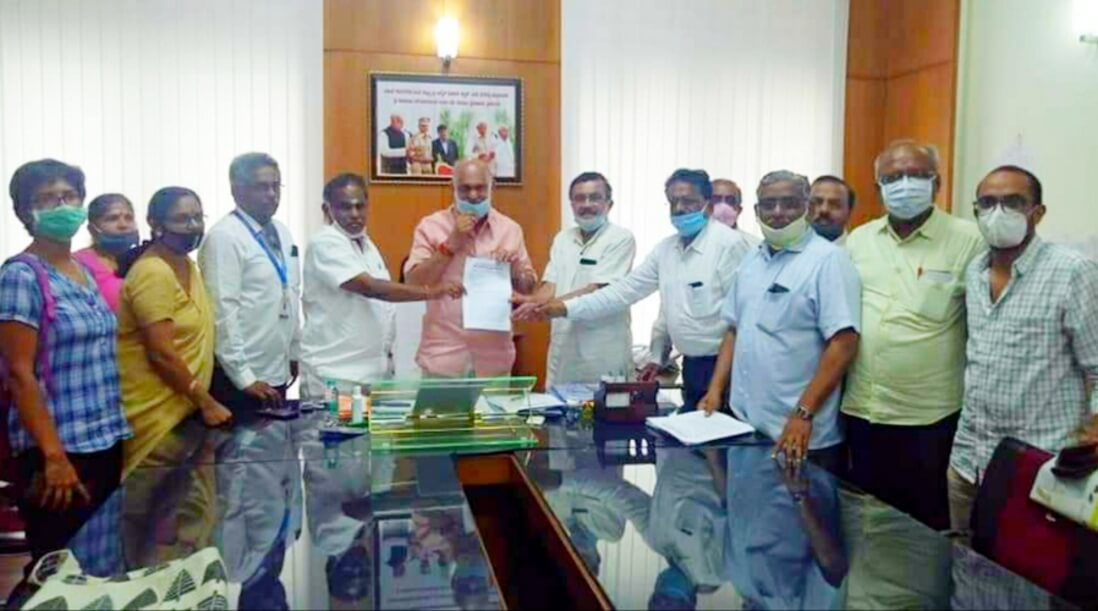
It is clear from the repeated invocations of the Prime Minister that in the imagination of the government, the only constituency the government addressed was the labour elite. When the Prime Minister referenced working at home, it is a privilege which only some sections of the labour elite could do. As one went lower down the labour hierarchy it became increasingly impossible to do. It was not possible for the petty bourgeoisie such as the owner of the small enterprises which remained shut under lockdown. Neither was it possible for those doing the hard labour of lifting in construction work and part of the lumpen proletariat. It was also not possible for those working in the garment sector and part of the sub-proletariat.
In other words, the decision of lockdown was taken, addressing how some section of the labour elite could continue to work, while ignoring the needs of 90 percent of the Indian working population.
One of the sections of the working class decimated by this autocratic imposition of lockdown is the migrant workers. The lockdown was characterised by the failure to ensure to the workers the most basic necessities of even food. The first indication that this was not considered was the images of migrant labour in thousands in bus stands and railway stations, desperate to get back. The poignant images of thousands of migrants walking sometimes literally hundreds of kilometers to get home, brought home the fact that the migrant worker did not figure in the decision to impose and implement the lockdown. Their exodus from the towns and cities and march on foot to their villages, with their families and children, was the largest since partition.
Sadly, it must be said, that it took the Coronavirus pandemic to bring to the fore the social reality of migrant labour, those oppressed sections of rural India travelling to all parts of the country in search of survival wages. Suddenly, the lakhs of people who migrate from UP, Bihar, Jharkhand, Chhattisgarh, Madhya Pradesh, Rajasthan, West Bengal, Assam, Tripura, Manipur, Orissa to the big cities and even rural areas of other States became visible. Their inhuman living conditions in workers’ colonies on construction and large infrastructure project sites were open for all to see. Just as an illustration, in Bengaluru more than 6000 migrant workers from Jharkhand, Bihar, West Bengal, Orissa, Uttar Pradesh and other states are employed in the construction of the Kempegowda International Airport expansion project. 40% of the 1.4 lakh workforce employed in 7000 licenced hotels, as is 45% of the 80,000 strong security guard workforce besides more than 10,000 migrant workers are employed in the construction of Metro. In last count more than 5 lakh migrant workers have registered themselves on the Karnataka Government online portal seeking to return home.
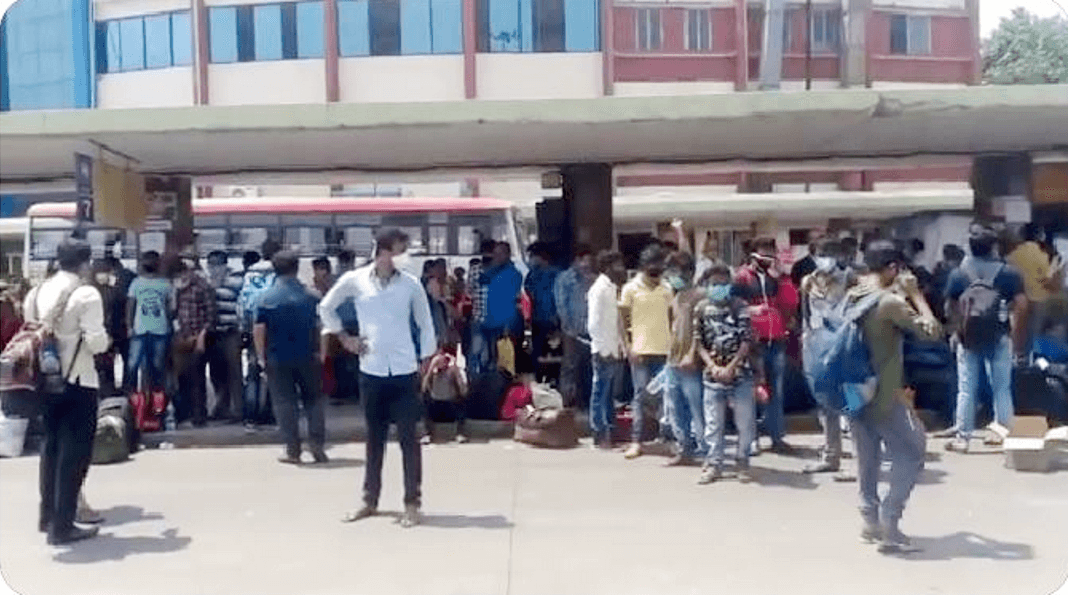
Response of the Government: Contempt for the workers while pushing their communal agenda
However, despite the very grave nature of the problem, the Modi Government was unconcerned with the existential crisis that the migrant workers were facing. The resistance of the migrant workers in the form of the first wave of exodus compelled the Modi Government to issue a notification on 29.03.2020 seeking to address the migrant worker issue by mandating that states should take care of the food and shelter needs of migrant workers in the place where they are stranded and also made it clear that employers should pay the migrant workers their due wages without any deductions and that house owners should not demand rent and workers should not be evicted from rented premises during the lockdown. Despite such order, the apathy was striking in its failure to take any step to enforce the same. The true face of the Modi government is revealed in its notification on 19.04.20 laying down the “Standard Operating System (SOP) for movement of Stranded Labour”, not paying heed to the voices of migrant workers to return home, instead coming up with a scheme for the stranded workers to be employed in permitted activities of ‘manufacturing, construction, farming and MGNREGA within the state in which they are stranded’. If the voices of migrant labour are articulating their need to go back home, the Central Government through its notifications has demonstrated that for it, migrant labour are not persons entitled to rights under the Constitution but rather labouring bodies who can be sent to perform labour at other sites regardless of what they want. The right to autonomy and the right to dignity of the migrant workers has no meaning for this government.
Instead, unable to counter the pandemic or the food, job and financial insecurity of people, RSS and BJP busied themselves with their hate-filled disinformation campaign blaming China and the Muslim community for the coronavirus epidemic and misleading the people by spreading fake news, superstitious beliefs and obscurantist ideas. A deliberate effort was made to selectively criminalise and communalise an international religious gathering of the Tableeghi Jamaat in Delhi though there were numerous other political and religious gatherings at the same time and even after that. Wild and baseless allegation targeted the entire community as ‘corona criminals’ propagating a ‘corona jihad’, and the blame for the entire pandemic was laid at the doorstep of the Muslim community. In fact, post a funeral in ISKCON UK confirmed 21 COVID positive cases in their London congregation, and that five have died. Apparently virus spread when about 1,000 people gathered at a 12th March funeral of a devotee. However, rightly this was not communalized. Instead, the Union Government chose to use the period of the lockdown to further target and isolate members of the Muslim community, including instances of social and economic boycott. In Bangalore, we witnessed such a targeting of persons from Bihar after a worker from Bihar was tested positive for COVID-19, where the media spoke of “Bihari-origin corona bomber” and targeted persons from Bihar.
We have encountered this hatred also in the migrant workers who were in touch with us for rations and to go back to their homes. We met thousands of migrant workers from Gorakpur, UP, who initially took pride in Yogi and Modi. However, as days passed and the sense of abandonment dawned on workers, especially given that they had to struggle to get rations from the State as also to get a train ticket back home, we could see a change in their views. Several workers who had Yogi and Modi as the profile picture on whatsapp actually removed it and participated in the poster and “bus haemin ghar jaana hain” campaigns, whose central slogan was “Thalli bi baja di, diya bi jala di, bahut ho gaya tamasha, bus hamein ghar jaana hain”.
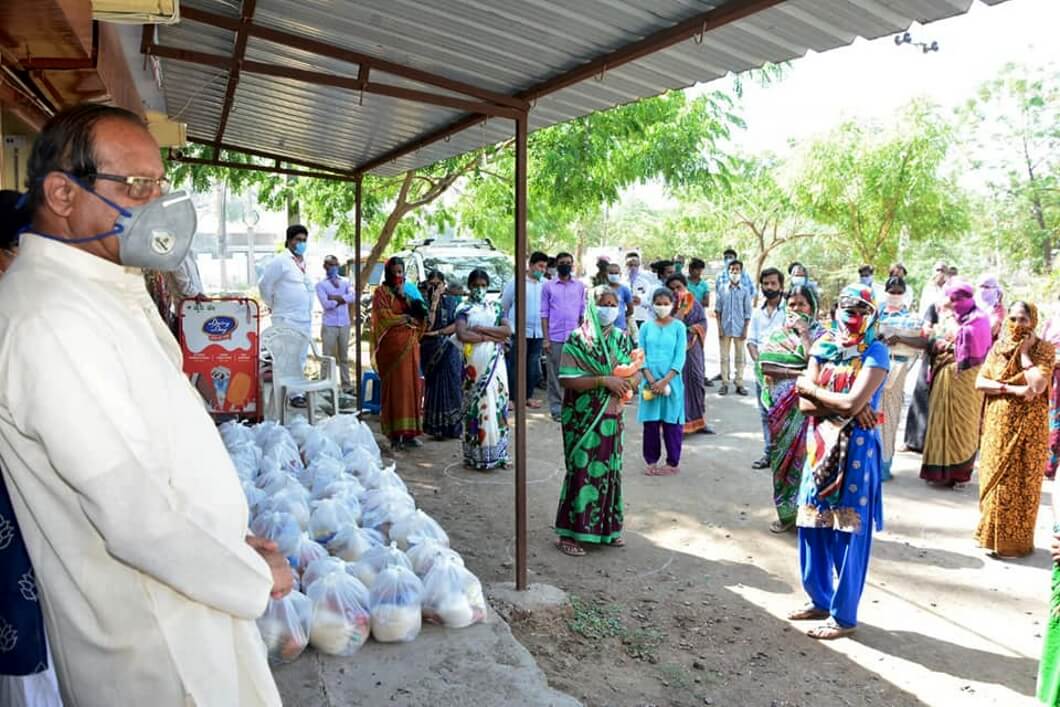
Response of CPIML and AICCTU
With the imposition of the lockdown, CPIML immediately set up a system to stand with the migrant workers stranded in various States. Com. Vinod Singh, MLA, Bagodar, Jharkhand put out a public call to migrant workers stranded across the country to contact him. In the three weeks of the lockdown, this helpline was dealing with distress calls of atleast 1000 migrant workers daily. Their numbers were forwarded to Party and AICCTU comrades in different states or other political activists in other states and cities who were engaged in relief work.
In Karnataka too, CPI(ML) and AICCTU responded to over 10,000 workers who reached out. While on one side there was an effort to ensure the provision of food/ration kits, on the other side, CPI(ML) and AICCTU launched a campaign to ensure that the government took the responsibility to ensure the provision of the basic necessity of food to all migrant workers. This campaign included a hunger fast and protest on 19th April seeking that the steps take immediate steps to protect the lives of migrant workers to live with dignity. A sustained campaign by various organizations finally resulted in the State Government agreeing to provide ration kits to migrant workers while the “Bas, hame ghar jaana hain” campaign ensured that trains were resumed for migrant workers.
From distributing relief amongst the workers to ensuring workers reach their homes, the AICCTU has been actively working with migrant workers across the State, along with several civil society organisations. Our approach was to build a political narrative with migrant workers in the focus to show the harsh impacts of the unplanned lockdown that has been imposed on the residents of this country.
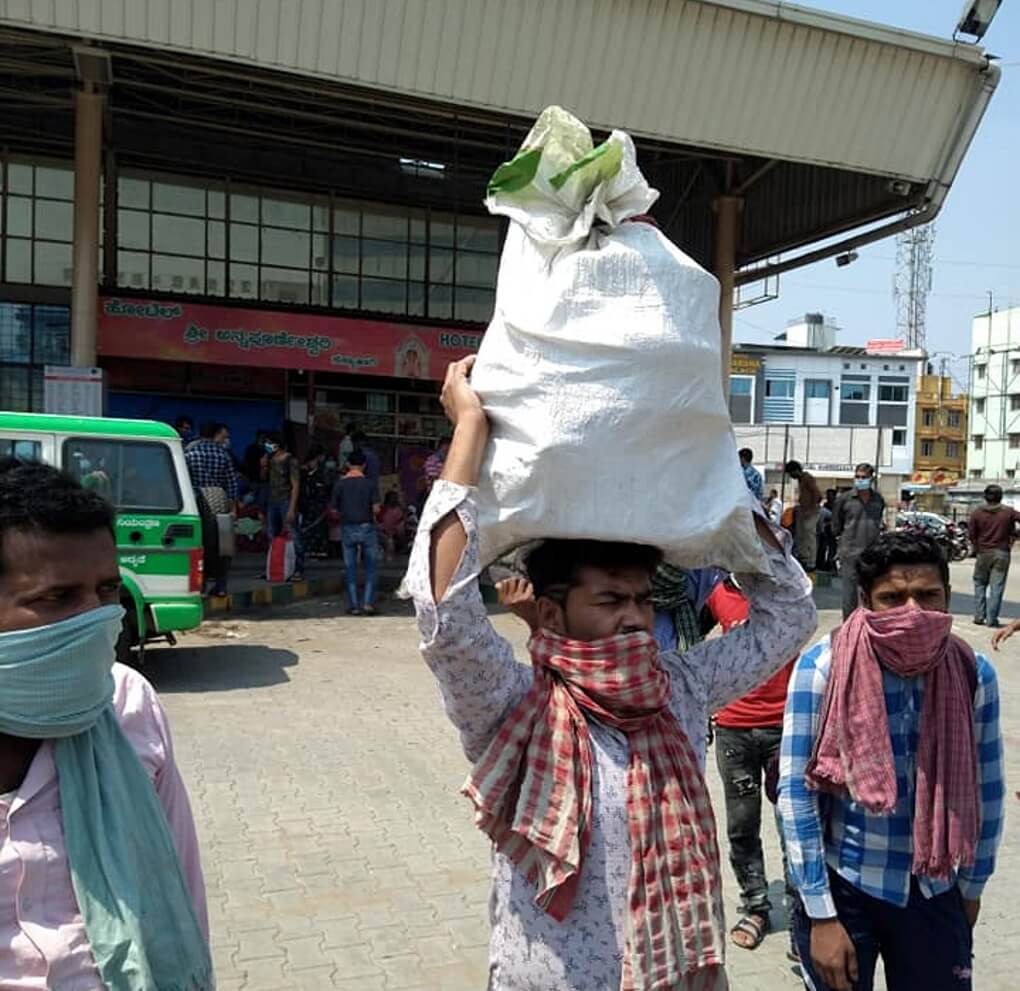
The fight to return home: Workers asserting their rights to decide their lives
We have seen two waves of the fight of the migrant workers to return home. The first wave was immediately on the announcement of the lockdown on 24th March and continued throughout the lockdown period. After all protests Modi government was forced to allow migrant workers to travel back to their States.
What does it take for a person to decide to walk to their homes, knowing that it is hundreds and even few thousand kilometres away - without knowing the language or having social networks; Without money in their hands, no food, unaware of the route to be taken, and oblivious of what lies around the corner, at the hands of the police or the authorities. The horror stories of what these migrant workers on the roads have had to endure is sufficient to shock any reasonable person’s conscience and torture some souls. However, the same did not move the government who while “permitting workers” to travel took no steps to ensure a dignified manner of return to the workers, even in the second wave when workers decided to return home in May.
In fact, the Karnataka Government took a decision not to run trains to take migrant workers back to their states on the dictates of the builder lobby. The AICCTU filed an application before the High Court seeking for free and safe transportation for workers. A sustained campaign organized by various organizations including AICCTU, “Bas, hame ghar jaana hain”, compelled the State Government to reverse this decision. The consequence though of this episode was the complete erosion of trust in the government and a common knowledge of its lack of commitment in respecting the decision and right of the migrant workers to return to their homes. This coupled with the arbitrariness in allocation of train tickets, lack of knowledge of trains, undignified treatment of workers at police stations where they are compelled to go to submit return application forms, low number of trains running, among other issues have only confirmed their suspicions that they are being held back in the state against their wishes and solely to compel them to return to work.
It is in this context that there is a second wave of migrant workers taking to the streets and in it lies the key to understanding their decision. The workers are articulating a feeling of being trapped. But, the migrant workers are unwilling to being held captive, against their wishes, and become helpless. They are asserting their right to decide their lives, their autonomy and are resolved to salvaging their dignity from the State’s concerted assault on it.
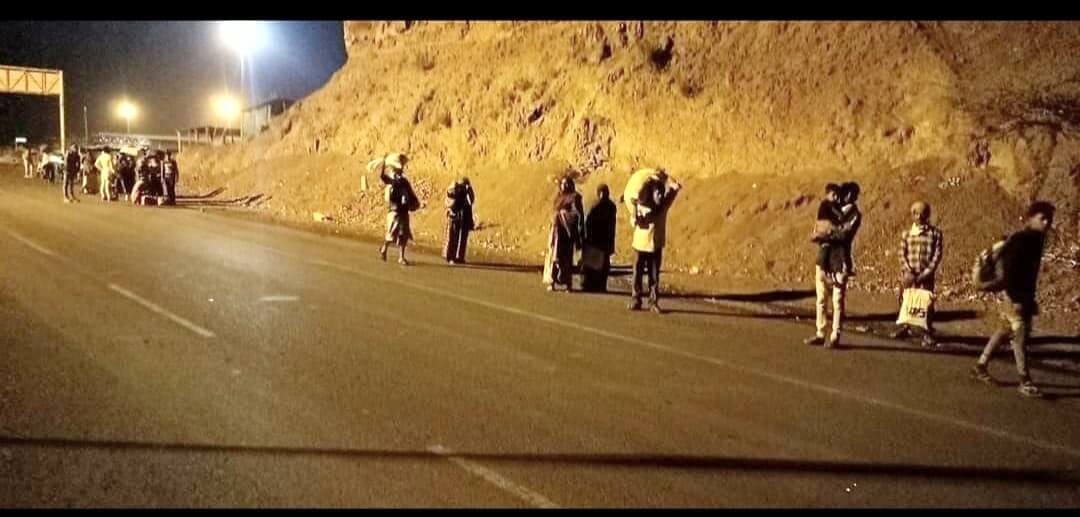
We shall fight! We shall win!
The young women workers of KPR Textiles from Nabrangpur district are finally boarding a train to Odisha at 11pm. But not without a fight! This was achieved at the end of a hectic day of calls and coordination from Chennai and Bhubaneswar. In fact the negotiations became tense since yesterday morning. Kudos to the AICCTU Coimbatore team that has been pushing the Coimbatore administration nonstop and the AICCTU President V Shankar who guided us well. The atmosphere in the company had become tense this morning as they picked 19 workers and put them on a bus. The HR made sure that the two or three women who were organising the entire exercise are pushed out of the company first. These women were verbally intimidated too. Following this all workers were angry and emotionally upset. Constant pressure from BBSR and AICCTU resulted in the Coimbatore administration having to accept the entire list and not send in batches. Those who were put on the bus were called back. Also, senior govt officers in Bhubaneswar helped ensure the women travel together and that too by train as we wanted. They conveyed this to us by 2pm. The group of 89 women will get down at Ganjam station. The Collector Nabrangpur has been informed. He and the Ganjam Collector will make transport arrangements to Nabrangpur from there. The women say they do not mind 28 days of quarantine as long as they reach Nabrangpur!
- Ranjana
(Ranjana is a progressive activist from Odisha who played a key role in securing young tribal women workers return to their home from Coimbatore.)
Liberation Archive
- 2001-2010
-
2011-2020
- 2011
- 2012
- 2013
- 2014
- 2015
- 2016
- 2017
- 2018
- 2019
-
2020
- Liberation, JANUARY 2020
- Liberation, FEBRUARY 2020
- Liberation, MARCH 2020
- Liberation, APRIL 2020
-
Liberation, MAY-JUNE 2020
- Stand With the Cyclone Ravaged Areas and People : Donate Generously to Relief Efforts
- The Lockdown Has Unlocked India's Suppressed Social Reality of Migrant Workers
- Modi's Covid19 Stimulus Package: Monumentally Deceptive and Disastrous
- Enslaving India's Workers and Renting Out India To Global Capital Is Not the Way to Self Reliance
- Dealing with the Lockdown: Precious Lessons from the Unique Experience of an Unprecedented Phase
- Remembering Ambedkar amidst the Covid19 Pandemic and Lockdown
- May Day 2020 : International Day of Workers in Times of Global Pandemic
- The 202nd Birth Anniversary of Karl Marx
- Experiences of Relief Work in Bihar: Government Abdicates, People take Initiative
- Lockdown Emboldens Feudal, Communal and Criminal Forces
- The Girl on a Bicycle
- Will the Government Not Give Us Jobs?
- Migrant Workers of Jharkhand Stranded in Maharashtra During Lockdown
- Lockdown Relief Reports from Uttar Pradesh
- The Varanasi Mohalla Kitchen Experience
- CPIML Activities in Kerala during the Lockdown
- Initiatives in Tamil Nadu During Lockdown
- Covid 19 Lockdown Relief Work in Chandigarh
- Thousands of Distressed Workers in Jaipur Come Out on the Streets
- Relief Work During Lockdown in Delhi
- Invisible but Irreplaceable? Migrant Labour BC 2019 and AC 2020
- Karnataka : Notes on Migrant Workers Assistance Campaign
- The Pandemic and Beyond : Free Quality Healthcare is a Fundamental Right
- Epidemic Act 1897 : A Draconian Colonial Hangover
- Kerala Model Delivers in Covid -19 Control
- A Note on Herd Immunity
- Modi Regime's War on Working Class
- Attacks on Students and Public Education
- The Pandemic's India Journey: Short Takes
- Open Letter to British Labour Party Leader: Don't Align the Labour Party with Allies of Modi's Far-Right Regime
- Facilitating the Corporate Plunder of Kashmir Under Cover of Covid19
- Hunger Strike by CPIML Leader BN Singh Incarcerated in Medini Nagar, Jharkhand
- Hari Vasudevan
- Tribute : Comrade Narender Kumar & Comrade Suhail Akhtar
- Liberation, JULY 2020
- Liberation, AUGUST 2020
- Liberation, SEPTEMBER 2020
- Liberation, OCTOBER 2020
- Liberation, NOVEMBER 2020
- Liberation, DECEMBER 2020
- 2021-2030
Charu Bhawan, U-90, Shakarpur, Delhi 110092
Phone: +91-11-42785864 | Fax:+91-11-42785864 | +91 9717274961
E-mail: info@cpiml.org







